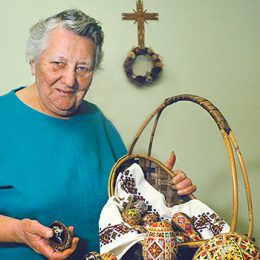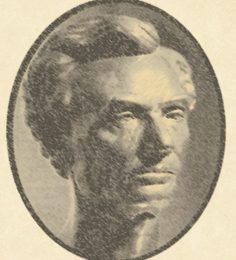(Note to readers: This article first appeared in the November 2001 edition of Electric Consumer.)

Jennifer and Eric Moody, and daughters Kelsey, from left, Kylee and Katlyn, have a special reason to be thankful this Thanksgiving. Eric and 28 colleagues from the Crane naval center escaped unharmed from the Sept. 11 attack on the Pentagon. (Note to readers: this photo accompanied the original story from November 2001.)
The hugs around Eric Moody might be a little tighter at the family Thanksgiving gatherings this year. They might last a little longer.
The family came close to losing the 30-year-old father of three.
Just how close? Only the power of prayer and the sound of an “angel’s voice” might accurately measure the distance between daylight and, as Moody said, “the valley of the shadow of death.”
Just how close?
On the morning of Sept. 11, Moody and 28 other civilian colleagues from Crane Naval Surface Warfare Center were on the fifth floor in the west wing of the Pentagon. At 9:40 a.m., the hijacked American Airlines Boeing 757 came barreling in right below them.
Through the jolt of the explosion and black smoke-filled corridors cluttered with debris, the group narrowly escaped becoming Indiana’s most tragic chapter in the day’s notorious terrorist attacks. Amazingly, no one from Crane was injured.
“Looking at the pictures on the news and looking at where we were on the diagram given us, I did some piecing together to come to my conclusions …,” Moody said. “We were as close as we could possibly be and still be alive to talk about it.
“It’s kind of a sobering thought that we made it out, but there were a lot of people who were not too far from us who didn’t.”
At least 189 people died in the Pentagon attack. At least four of them had ties to Indiana. In New York City, latest tolls show 5,500 people died or are missing in the attacks on the World Trade Center. That number includes at least three native Hoosiers.
The Crane group was in Washington, D.C., for a weeklong course on defense policy. The course, taught in locations around the city, was the capstone of a seven-course leadership class offered to Crane managers. Tuesday, Sept. 11, was “Pentagon Day.”
Moody, a consumer of Utilities District of Western Indiana REMC from rural Bloomfield, and his co-workers in the class arrived at the Pentagon around 9:10 a.m. The first meeting was with Susan Livingstone, under secretary of the Navy, in an interior conference room on the fifth floor of the newly remodeled wing.
Livingstone began by first informing the group that terrorists had just hijacked two jets and flown them into the twin towers of the World Trade Center in New York. Moody, who wrote an account of the day’s events on the bus ride back to Indiana the next day, noted, “At that point, it dawned on me that we could be in a ‘targeted’ area and might be in danger. Therefore, I said a short prayer as I often do, ‘Dear God, please keep us safe!’”
Because of an impending important meeting, Livingstone said she would have to cut her talk short and quickly wrapped up. She began a question and answer session and was in the middle of answering the first question when it hit.

The American Airlines Boeing 757 crashed into the first three floors of the Pentagon between Corridors 4 and 5. It penetrated three rings deep. The Crane group was on the fifth floor, between Corridors 4 and 5 in the second ring.
“A large blast shook the entire room,” wrote Moody. “Several of the panels from the suspended ceiling fell to the floor and the light fixture in the middle of the room came crashing down on the conference table. Smoke immediately began filling the room from the light fixtures and vents in the ceiling.
“Ms. Livingstone calmly but firmly stated that we were under a terrorist attack, and that we should immediately leave the building.”
Moody noted that stairs in the stairwell directly outside the conference room had been demolished and blocked. Thick, black smoke filled the area. Pentagon employees, using their normal evacuation route, told them to head another direction.
He said confusion and congestion in the hallway prevented him and several others in the group from leaving the conference room immediately. They dropped low to stay beneath the smoke and covered their mouths and noses with jackets, shirt sleeves, whatever was available, to prevent breathing in the smoke.
After a minute or so, they made their way down a hallway, dodging fallen debris. He heard someone yell, “Watch your step — there’s a step down right here.” The entire structure beneath them had given way and separated, causing the floor to drop about a foot.
“Because this inner passageway was completely filled with smoke, it was impossible to see anything,” Moody wrote. “I was not familiar with the building and I had no idea where I was or which way to head. I realized I was having difficulty in breathing due to the smoke and extreme heat. This was the first time during the incident where I began to be concerned about whether I would make it out alive.”
A prayer on the Potomac
Moments earlier, several miles north of the Pentagon, Jennifer Moody was at Arlington National Cemetery. She accompanied her husband on the Washington trip, leaving their three daughters, Katlyn, age 6; Kylee, 3; and 18-month-old Kelsey, at home with Eric’s parents.
She was going to spend the beautiful late-summer day sight-seeing on her own. She had just purchased a ticket for a tour of George Washington’s Mount Vernon estate and was waiting for the tour bus to take her there.
Then, she heard the boom and saw the smoke.
When she found out that the Pentagon had been hit by a plane, she said a prayer for Eric’s safety. She also said a prayer for some guidance.
“It was very frustrating,” she said. “There was a sense of not knowing what to do.” She wasn’t sure if she should go back to the hotel where they were staying or try to get to the Pentagon. When she decided to head to the hotel, which was across the Potomac River not far from the White House, she found the metro system shut down. She had to walk.
On the way, she said, she started walking with a man who had come from the Pentagon, and they started talking. Though it was mostly small talk, she said he was reassuring. “It kept my mind off of what the situation Eric might be in,” she said. “I was really worried about him. I kept telling myself the Pentagon is a big place, and he probably wasn’t where the plane hit.… Little did I know that he was.”
The valley of the shadow of death
Back in the Pentagon, the situation had gotten even worse for Eric.
“There seemed to be silence — just for an instant — and at this point, I feared for my life,” he wrote. “Fortunately, there was a Pentagon official ahead of us directing traffic. I heard him direct us to grab on to the person ahead of us and keep walking in his direction. Unfortunately, when I reached out to grab the person ahead of me, nobody was within reach. I felt someone behind me grab my coattail, but there was nobody for me to follow. I sensed I was lost.”
Moody said he called out for the man to keep talking so he could follow his voice. The man, a Pentagon military employee, told him to find the wall and follow it. “I began to panic more because I could not immediately reach a wall,” he said. “I called out again for him to keep talking.”
The man encouraged them to keep walking and that they would see some light ahead.
“It seemed like an eternity even though it was probably only a few seconds, but I kept walking — hoping I would not stumble over something I could not see. Finally, I began to see some light ahead, and I was able to see the official who was guiding us. This man was an angel of God sent to lead us through the valley of the shadow of death to where there was light,” Moody wrote.
“The voice of the angel,” he later recalled, “that was our saving grace.”
The group quickly made its way down the lit corridor and the smoke diminished. They then continued down several sets of escalators to the ground floor and exited the building’s south side.
Once a safe distance from the building, the group stopped to make sure everyone was accounted for. “Somehow,” Moody noted, “our whole group was able to remain calm and collected, stay together and get out of the building without injury — all within a period of 20 minutes.”
He said they then learned from other Pentagon employees what had happened. “As we contemplated the events, I had a sinking feeling that we would soon discover the real danger we were in, and how fortunate we were to get out alive.”
Later, as Moody correlated information he had about the Pentagon with news reports, he said his suspicions were verified. “We were almost directly above (not more than 50 feet away) from the area of impact. As we were evacuating, we actually walked across the portion of the building (where we had to step down) that collapsed only 30 minutes later.”
Reunion
About two hours after she started walking, Jennifer arrived back at the hotel from Arlington. Alone in their room, she waited for Eric’s return. She had only been there a short while when the hotel called up. They received word that the group was on its way back, and everyone was safe.
Fifteen minutes later, Eric walked into the room. “It was very emotional for both of us,” he said.
“That was a huge relief,” said Jennifer. “The first time I felt I could let myself cry was when he told me he was OK, and everything would be fine.”
She said as soon as he walked in, though, she smelled the smoke on him and realized he was close. “That’s when he told me he was right there.”
Most of the rest of the day, the group watched the news accounts on television and discussed their close call. They also contacted the folks back home to let them know no one in the group was hurt.
With all flights grounded, a Star of Indiana charter bus was dispatched to Washington that night to bring the group home. The next day, they boarded the bus. During the ride, they once again discussed their harrowing escape. Eric also wrote his account of the event at the urging of his dad, also a Crane employee, during a cell phone call.
After getting approval from Crane officials, Moody e-mailed his “trip report” to friends and family. It soon spread. It showed up in local south-central Indiana newspapers. An Electric Consumer employee was e-mailed a copy. Even a newspaper in Australia published his account.
Homecoming
Moody said in the weeks after that attack, he noticed quite a bit of change. He said the events had “drawn the religion” out of some members of the group. “We all agree that we were extremely fortunate to survive this devastating situation. God Almighty had His hand upon us!” he wrote.
He said he’s also noticed a change in other people, too. “It’s kind of interesting how many hugs I’ve gotten from people I wasn’t that close to who have felt the pain along with me.”
Jennifer noted that in those moments before and after the attack, they both said prayers. And both were answered. Eric asked for the group to be kept safe. She asked God for Eric’s safety and His support. “I felt the guy who came from the Pentagon was the person sent to keep me calm and get me back to the hotel.”
Though he was concerned about getting out of the Pentagon, Moody said later, “I don’t think I had the thought, ‘I’m going to die.’ I’ve always been a positive thinker. I’ve always felt the presence of the Lord with me in all that I do, so I didn’t have the fear of dying at the time.”
After getting out, the Crane employees didn’t have a chance to meet the Pentagon employees who led them to safety. But the Pentagon has since identified them. Moody said his class is planning to officially thank them at a dinner when they return to Washington in February to complete the course.
A day of Thanksgiving
Thanksgiving has always been a special holiday for the Moodys. They usually work their way to several large family gatherings around Crawfordsville and Fort Wayne. This year probably will be no different, they said — except the holiday will be the first time many family members will see Eric since before the Sept. 11 events. He and Jennifer said they expect things might be a little more emotional.
“It’s different because you know no matter what your plans are, things can change in a second. That change can be a very bad one,” Jennifer said. “So, you have to realize the times you are together … how special they are.”
Jennifer’s sentiment likely will be present at Thanksgiving gatherings all across America this year. Since Sept. 11, most Americans have been taking stock of their lives. Americans will be putting a special emphasis on their families, their faith and the feelings of warmth and security these holiday homecomings bring.
This Thanksgiving, hugs everywhere might be a little tighter … and might last a little longer.
Richard G. Biever is senior editor of Electric Consumer.
- To read how Indiana’s electric cooperatives are responsive to first responders, click here.
- To read how a Pennsylvania electric cooperative responded to the needs of first responders after the crash of United Flight 93 on 9/11, click here.
- To read Richard G. Biever’s commentary on the 10th anniversary of 9/11, click here.



